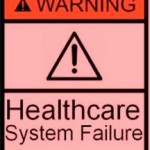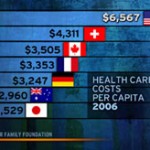– What to say?  This is one aspect of the U.S. that I will not be sorry to leave behind when I shift to New Zealand.
– – – – – – – – – – –
The Independent (UK)
Tue, 25 Aug 2009
The US tolerates more inequality, deprivation and suffering than is acceptable here
 When we Europeans – the British included – contemplate the battles President Obama must fight to reform the US health system, our first response tends to be disbelief. How can it be that so obvious a social good as universal health insurance, so humane a solution to common vulnerability, is not sewn deep into the fabric of the United States? How can one of the biggest, richest and most advanced countries in the world tolerate a situation where, at any one time, one in six of the population has to pay for their treatment item by item, or resort to hospital casualty wards?
When we Europeans – the British included – contemplate the battles President Obama must fight to reform the US health system, our first response tends to be disbelief. How can it be that so obvious a social good as universal health insurance, so humane a solution to common vulnerability, is not sewn deep into the fabric of the United States? How can one of the biggest, richest and most advanced countries in the world tolerate a situation where, at any one time, one in six of the population has to pay for their treatment item by item, or resort to hospital casualty wards?
The second response, as automatic as the first, is to blame heartless and ignorant Republicans. To Europeans, a universal health system is so basic to a civilised society that only the loony right could possibly oppose it: the people who cling to their guns, picket abortion clinics (when they are not trying to shoot the abortionists) and block funding for birth control in the third world. All right, we are saying to ourselves, there are Americans who think like this, but they are out on an ideological limb.
If only this were true. The reason why Obama is finding health reform such a struggle – even though it was central to his election platform – is not because an extreme wing of the Republican Party, mobilised by media shock-jocks, is foaming at the mouth, or because Republicans have more money than Democrats to buy lobbying and advertising power. Nor is it only because so many influential groups, from insurance companies through doctors, have lucrative interests to defend – although this is a big part of it.
It is because very many Americans simply do not agree that it is a good idea. And they include not only mainstream Republicans, but Democrats, too. Indeed, Obama’s chief problem in seeking to extend health cover to most Americans is not Republican opposition: he thrashed John McCain to win his presidential mandate; he has majorities in both Houses of Congress. If Democrats were solidly behind reform, victory would already be his.
The unpalatable fact for Europeans who incline to think that Americans are just like us is that Democrats are not solidly behind Obama on this issue. Even many in the party’s mainstream must be wooed, cajoled and even – yes – frightened, if they are ever going to agree to change the status quo. Universal healthcare is an article of faith in the US only at what mainstream America would regard as the bleeding- heart liberal end of the spectrum.
As some of Obama’s enemies warned through the campaign – and I mean warned, not promised – this is the philosophical terrain where, his voting record suggests, this President is most at home. But many more are not. The absence from the Senate of Edward Kennedy, through illness, and Hillary Clinton, elevated to the State Department, has left his pro-reform advocacy in the legislature sorely depleted.
But there is something else at work here, too, beyond defective advocacy, and it lays bare a profound misunderstanding. Europe hailed Obama’s landslide election victory as evidence that America had reclaimed its better self, turned to the left and bade farewell to ingrained racial divisions as well. That was a benevolent, but ultimately idealistic, gloss.
Obama’s victory can indeed be seen as a reaction to eight years of conservative Republicanism under George Bush and a turn by US voters to the left. But that left is still quite a bit further right than in most of Europe. Nor was it just a leftward turn that cost John McCain the White House; it was also a rejection of the weaker candidate. Obama’s great asset was that he came across as more competent on the economy, at a time of global financial meltdown. From this side of the Atlantic, we convinced ourselves that Americans had voted with their hearts, but there was a considerable element of the wallet as well.
That wallet element helps explain the deep-seated misgivings that have surfaced about Obama’s plans for health reform. A majority of Americans believe they have adequate health cover. Their choice of job may be limited by their insurance requirements (and labour mobility reduced). And their calculations may be upset – sometimes disastrously – by accident or illness.
But with most pensioners protected by the state system known as Medicare, an “I’m all right, Jack” attitude prevails. It coexists with the fear that extending the pool of the insured, to the poorer and more illness-prone, will raise premiums for the healthy and bring queuing, or rationing, of care – which is why stories about the NHS inspire such dread. The principle that no one should be penalised financially by illness is trumped by the self-interest of the majority, then rationalised by the argument that health is a matter of personal responsibility.
The point is that, when on “normal”, the needle of the US barometer is not only quite a way to the political right of where it would be in Europe, but showing a very different atmospheric level, too. For there is a mean and merciless streak in mainstream US attitudes, which tolerates much more in the way of inequality, deprivation and suffering than is acceptable here, while incorporating a large and often sanctimonious quotient of blame.
This transatlantic difference goes far beyond the healthcare debate. Consider the give-no-quarter statements out of the US on the release of the Lockerbie bomber – or the continued application of the death penalty, or the fact that excessive violence is far more common a cause for censorship of US films in Europe than sex. Or even, in documents emerging from the CIA, a different tolerance threshold where torture and terrorism are concerned.
Some put the divergence down to the ideological rigidity that led Puritans and others to flee to America in the first place; others to the ruthless struggle for survival that marked the early settlement years and the conquest of the West. Still others see it as the price the US pays for its material success. What it means, though, is that if and when Obama gets some form of health reform through, it will reflect America’s fears quite as much as its promise. And it is unlikely to be a national service that looks anything like ours.
To the original… ➡
– Research thanks to John P. and Charles S.
 who will fight to the death to prevent any serious cost cutting, and it’s why Obama and the Democrats in Congress have largely chosen to buy them off instead.
who will fight to the death to prevent any serious cost cutting, and it’s why Obama and the Democrats in Congress have largely chosen to buy them off instead.


